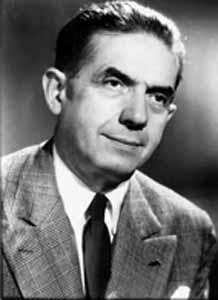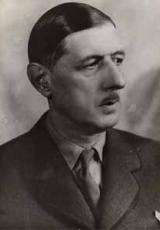Edmond Michelet

Edmond Charles Octave Michelet was born in the 19th arrondissement of Paris on the 8th October 1899. As soon as he was 18 he enlisted voluntarily for the duration of the war. Appointed to the 126th infantry regiment of Brive, he discovered Corrèze where he married. He campaigned for the ACJF (Young French Catholic Action movement) of which he became president in Béarn and then in Corrèze. In 1932, he developed the Social Teams created by Robert Garric in 1919, whose aim was to facilitate the professional, intellectual and moral advancement of all its underprivileged members. Faced with the rise in Nazism, he created the Duguet Circle, a think tank that organised, amongst other things, a series of conferences called: "the dangers threatening our civilisation". As a father, he was not called up in 1939, but organised the national charity for helping the many refugees.
He made his first act of resistance in June 1940 by distributing, along with some friends in Brive, a tract quoting a text by Péguy: "the one who does not surrender to reason against the one who surrenders". In 1942, he became regional manager and then took over in charge of region 5 of the MUR (United Resistance Movement). On the 25th February 1943, Michelet was arrested by the German police for his acts of resistance acts. Imprisoned secretly at first for 6 months in Fresnes, he was deported to Dachau on the 15th September 1943. On the liberation of the camp on the 29th April 1945, he represented France on the international committee and dealt with the repatriation of all the French and the Spanish internees. He returned to France on the 27th May 1945.
In July 1945, he was appointed a member of the provisional consultative Assembly by the MLN (Movement of National Liberation). On the 21st October 1945, he was elected representative for Corrèze at the first constituent Assembly in the ranks of the MRP (Popular Republican Movement). In November 1945 he became the Minister for the Armed Forces in De Gaulle's government. In June 1946, he was elected representative for the second constituent Assembly and in November 1946, he was elected representative in the first legislative assembly. Beaten in the legislative elections of 17th June 1951 in Corrèze, he was elected councillor of the Republic in May 1952 and became vice-president of the 1958 High Assembly. In 1954, he headed the French delegation at the UN. In June 1958, Michelet became the minister for Ex-servicemen. He joined the Constitutional Council in February 1962. On the 12th March 1967, he was elected MP for the first Constituency of Finistère: Quimper. A month later, Edmond Michelet returned to government as minister in charge of the Civil Service.
After May 1968, he was minister without portfolio. Following the elections of the 23rd and 30th June 1968, with the formation of Couve de Murville's government, he found himself back in his seat as the representative to the Assembly for Finistère. He left it on the 22nd June 1969 to take care of Cultural Affairs in the Chaban-Delmas government, where he succeeded André Malraux. He occupied this position until his death in Marcillac near Brive on the 9th October 1970. Edmond Michelet received the 1959 Resistance literary prize and the Franco-Belgian literary Grand prix for Liberty in 1960 for his book of memoirs, "Rue de la liberté". He was president of the Amicable Society for Former members of Dachau, which he was able to keep going despite the cold war, and the founding president of the France-Algeria Association in 1963.


